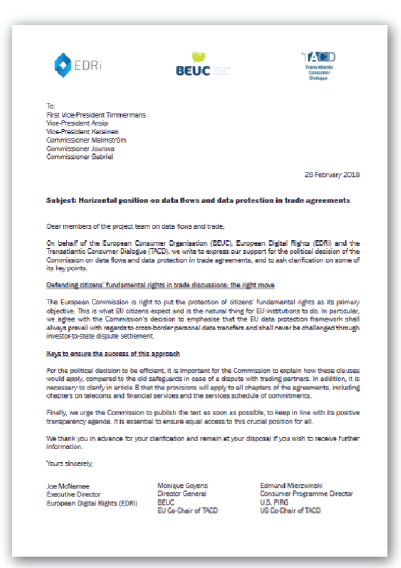The European Commission rightly decides to defend citizens’ privacy in trade discussions
On 31 January 2018, the European Commission adopted horizontal clauses on data flows, data protection and privacy in trade deals. On 9 February, these provisions were leaked.
The European Consumer Organisation (BEUC), European Digital Rights (EDRi), and the Transatlantic Consumer Dialogue (TACD) welcome the European Commission’s political decision. The adoption of this position is very positive as it demonstrates that the EU will protect its citizens’ fundamental rights when negotiating free trade deals.
For many years, we have repeatedly requested that data protection and data flows be fully excluded from trade deals. Adequacy decisions are a better instrument to enable data flows. However, not all adequacy decisions are properly negotiated or designed, as the “Privacy Shield” revealed. If the EU must negotiate on data flows as part of trade agreements, the consideration of additional safeguards should be imperative. The EU’s data protection and privacy rules are a model for citizens’ rights in many parts of the world and represent a fundamental pillar of our legal system that responds to the necessity of protecting and promoting EU citizens’ fundamental rights in practice. These rules must never be undermined by a trade agreement. The European Data Protection Supervisor (EDPS) has expressed similar views.
Unfortunately, not all countries around the world protect their citizens’ fundamental rights like we do, and they could therefore challenge our legal acquis via trade deals. Through this political decision, the European Commission ensures that this will never be the case.
As the Commission pointed out in its press release, the proposed data protection and privacy clause is a horizontal and a non-negotiable red line. BEUC, EDRi and TACD appreciate the Commission’s efforts not to negotiate on personal data protection and privacy in trade agreements. We agree with the Commission’s decision to emphasise that the EU data protection framework shall always prevail with regards to cross-border personal data transfers and shall never be challenged through investor-to-state dispute settlement.
In a letter to the European Commission we have asked for clarification regarding the publication of the text and its application in trade agreements.
Background
This move from the Commission shows the EU is building on its General Data Protection Regulation (GDPR) success. It allows other countries to have a regulatory space to adopt adequate safeguards to protect two fundamental rights, the rights to personal data and privacy. As independent research shows, old trade language is not sufficient to ensure the protection of people’s rights. As previously highlighted, modern digital markets need personal data. For example, a consumer’s personal data usually needs to be processed to conclude an online purchase. Citizens should not need to care about territorial borders It is crucial that trade deals do not undermine fundamental rights to privacy and personal data protection, and ultimately, trust in the online economy.
BEUC-EDRi letter to Commissioner Malmström on Data flows in trade (15.12.2017)
https://edri.org/files/trade/edri-beuc_letter_malmstrom-dataflowsintrade_20171215.pdf
EDPS Statement: Less is sometimes more (18.12.2017)
https://edps.europa.eu/press-publications/press-news/blog/less-sometimes-more_en
Study “Trade and privacy – Difficult bedfellows? How to achieve data protection-proof free trade agreements” (13.07.2016)
https://www.ivir.nl/publicaties/download/1807
BEUC-EDRi-TACD-CDD Statement: The EU can achieve data protection-proof trade agreements (13.07.2016)
https://edri.org/study-launch-eu-can-achieve-data-protection-proof-trade-agreements/


